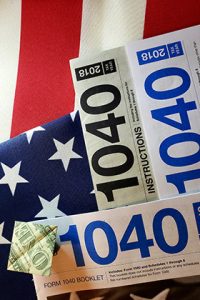
Business Advisory Services
Everything you need to help you launch your new business entity from business entity selection to multiple-entity business structures.
Hey - Our site just had a makeover and we are sorting through the hiccups!
Hey - Our site just had a makeover and we are sorting through the hiccups!

Everything you need to help you launch your new business entity from business entity selection to multiple-entity business structures.

Designed for rental property owners where WCG CPAs & Advisors supports you as your real estate CPA.

Everything you need from tax return preparation for your small business to your rental to your corporation is here.

WCG’s primary objective is to help you to feel comfortable about engaging with us
Table Of Contents
![[page_title]](https://wcginc.com/wp-content/uploads/WCG-Placeholder-h-300x183-1.jpg)
 The Tax Cuts and Jobs Act of 2017 created a new tax deduction for business owners (and others) called the Section 199A Qualified Business Income Deduction. Later in August 2018, the IRS released Proposed Regulations 1.199A to offer some additional insight to Section 199A. However, some of it reads well and some of it doesn’t, and we continue to field questions from clients and other small business owners all the time. As such we created a blog post titled Section 199A Frequently Asked Questions.
The Tax Cuts and Jobs Act of 2017 created a new tax deduction for business owners (and others) called the Section 199A Qualified Business Income Deduction. Later in August 2018, the IRS released Proposed Regulations 1.199A to offer some additional insight to Section 199A. However, some of it reads well and some of it doesn’t, and we continue to field questions from clients and other small business owners all the time. As such we created a blog post titled Section 199A Frequently Asked Questions.
Before we get into Section 199A questions and answers, here are some additional resources for your review-
No. It is available to sole proprietors (no entity formation), rental property owners (as far as we know and the proposed regulations do not state otherwise), S corporation shareholders and partnerships (multi-member LLCs, LLPs, and all the other goofy variants). Having an LLC is a good idea for other reasons, but the Section 199A deduction is not one of them.
No. It is a deduction taken on the owner’s individual tax return on page 2 of Form 1040 on line 9. Don’t look at your 2017 tax returns for line 9… the IRS decided to chop up Form 1040 into multiple parts and relabeled them Schedules for the sake of everyone’s desire to have a postcard tax return. No one seems to complain about state tax returns which can easily exceed 3 pages (California).
Back to the IRS and Form 1040 being chopped up… For example, Schedule 1 is titled Additional Income and Adjustments to Income which is essentially page 1 of old school Form 1040. Here is a draft Form 1040 with the numbered schedules. As of October 13, 2018, the IRS was still tinkering with these. These numbered schedules plus the traditional lettered ones (A, B, C, D, E, F, etc.) is absolutely silly… have a 3 page Form 1040 with lettered schedules as necessary. Much simpler, yet we digress.
Yes, but there are rules outlined in IRS Notice 2019-7 including Section 199A safe harbor requirements. You should also read our blog post specifically on the Section 199A rental property rules and analysis.
 Simple. The way Section 199A is written, there are limitations based on household income so it would be difficult for the business entity tax return to have visibility into each owners’ individual tax situation (not to mention privacy concerns).
Simple. The way Section 199A is written, there are limitations based on household income so it would be difficult for the business entity tax return to have visibility into each owners’ individual tax situation (not to mention privacy concerns).
Section 199A defines certain professions where the deduction is limited when certain income thresholds are exceeded. The list is health, law, accounting, actuarial science, performing arts, consulting, athletics, financial services, brokerage services, investing services and securities trading services. Plus any trade or business where the principal asset of such trade or business is the reputation or skill of one or more of its employees or owners.
Yes. The Proposed Regulations 1.199A expanded definitions of SSTBs. Specifically for health, the regs state that anyone who provides medical services is considered a specified service trade or business. This means that nurses, nurse anesthetists, chiropractors, physical therapists, massage therapists, etc.
Law includes attorneys, paralegals, mediators and arbiters. Accounting includes CPAs, Enrolled Agents, bookkeepers, tax professionals, financial auditors, etc. Credentials do not make or break this definition.
SSTB is determined at the entity level. So, if an entity is designated a specified service trade or business, all owners are subject to this possible limitation regardless of their individual title or contribution to the business. For example, let’s say Fred Flintstone and Mr. Slate are owners together. And Mr. Slate’s reputation or skill is known all over the world and it is the primary catalyst for the success of the business. Fred will also be deemed an owner of a specified service trade and business, and could further be limited on his Section 199A deduction. Guilty by association.
Maybe. Perhaps. You might. Yes and No. This is one of the biggest confusions out there. If you are a married doctor making $300,000 as a household you do not lose your Section 199A deduction, but if you make $500,000 you do. Read that again. Being labeled as a specified service trade or business isn’t bad until you meet income thresholds, which are $157,500 for singles and $315,000 for married filing joint. These numbers represent the end of the 24% marginal tax bracket, and the next tax bracket is 32%. This means the 32%, 35% and 37% represent the wealthier taxpayers and as such the Section 199A deduction becomes limited.
Nice try. The IRS is smart. Congress is smart. The Joint Committee on Taxation is smart. Stop laughing… really, they are! And they saw you coming a mile a way… probably heard you too. All kidding aside, the tax code is very, very careful to prevent simple tax arbitrage based on tax filing status. If you are married filing separately, your $315,000 becomes $157,500 anyway. And… if you are in a community property state it might not make a difference since the K-1 will be the tax document coded with the specified service trade or business designation and splitting your income 50-50 (like in California) doesn’t appear to help.
Here is our summary of the major issues recently updated by the final regulations, rental property safe harbor (Notice 2019-7) and how all this crud affects S corporations-
Jason Watson, CPA is the Managing Partner of WCG (formerly Watson CPA Group), a business consultation and tax preparation firm, and is the author of Taxpayer’s Comprehensive Guide on LLC’s and S Corps which is available online.

Learn about important tax deadlines, document checklists and due dates, and other essential tax return information.
Jason Watson, CPA is a Partner and the CEO of WCG CPAs & Advisors, a boutique consultation and tax preparation CPA firm located in Colorado, and is the author of Taxpayer’s Comprehensive Guide on LLC’s and S Corps and I Just Got a Rental, What Do I Do? which are available online and from mostly average retailers.

Learn about important tax deadlines, document checklists and due dates, and other essential tax return information.
Jason Watson, CPA is a Partner and the CEO of WCG CPAs & Advisors, a boutique consultation and tax preparation CPA firm located in Colorado, and is the author of Taxpayer’s Comprehensive Guide on LLC’s and S Corps and I Just Got a Rental, What Do I Do? which are available online and from mostly average retailers.
With state apportionment and tax return preparation, there are two issues at play- apportionment itself, and then state tax return
Table Of Contents

Tax planning season is here! Let's schedule a time to review tax reduction strategies and generate a mock tax return.

Tired of maintaining your own books? Seems like a chore to offload?
Did you want to chat about this? Do you have questions about us? Let’s chat!
The tax advisors, business consultants and rental property experts at WCG CPAs & Advisors are not salespeople; we are not putting lipstick on a pig expecting you to love it. Our job remains being professionally detached, giving you information and letting you decide within our ethical guidelines and your risk profiles.
We see far too many crazy schemes and half-baked ideas from attorneys and wealth managers. In some cases, they are good ideas. In most cases, all the entities, layering and mixed ownership is only the illusion of precision. As Chris Rock says, just because you can drive your car with your feet doesn’t make it a good idea. In other words, let’s not automatically convert “you can” into “you must.”
Let’s chat so you can be smart about it.
We typically schedule a 20-minute complimentary quick chat with one of our Partners or our amazing Senior Tax Professionals to determine if we are a good fit for each other, and how an engagement with our team looks. Tax returns only? Business advisory? Tax strategy and planning? Rental property support?

Everything you need to help you launch your new business entity from business entity selection to multiple-entity business structures.

Designed for rental property owners where WCG CPAs & Advisors supports you as your real estate CPA.

Everything you need from tax return preparation for your small business to your rental to your corporation is here.

WCG’s primary objective is to help you to feel comfortable about engaging with us
